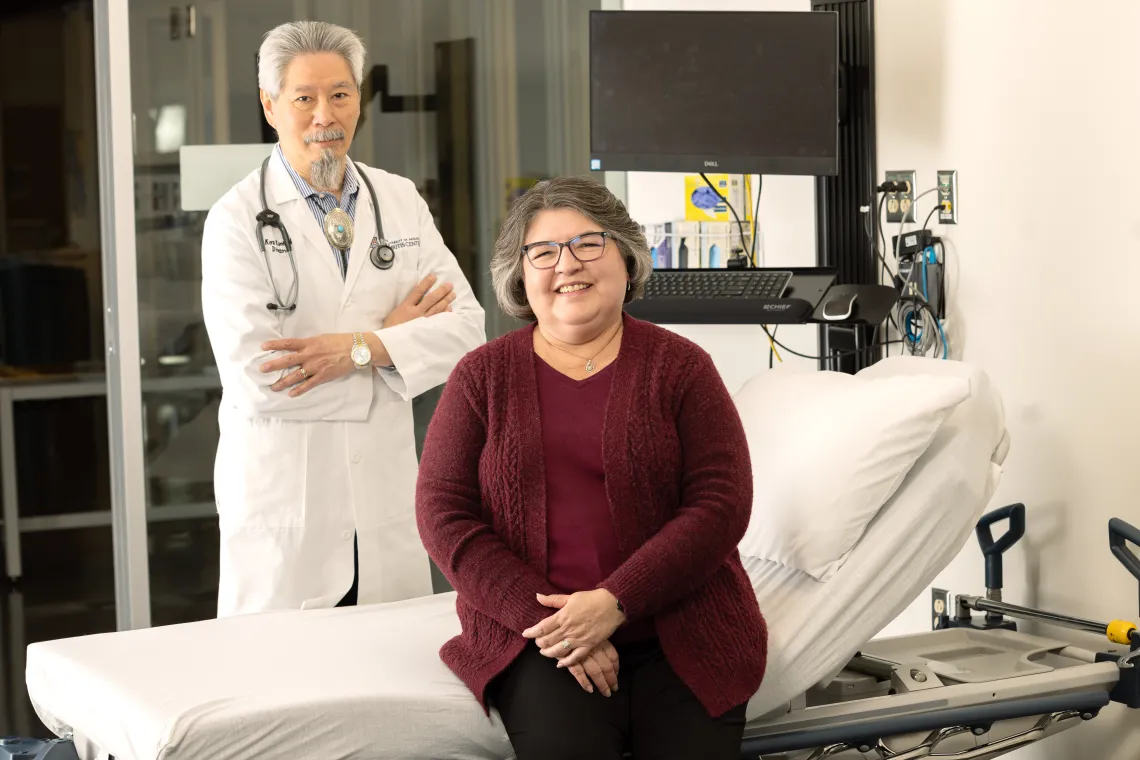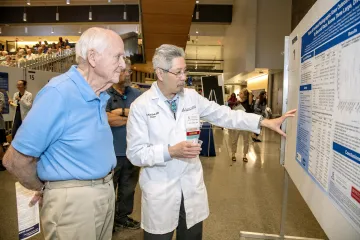Giving Back and Receiving
Proud Wildcat finds hope and support through the University of Arizona Arthritis Center.

Arthritis Center Director C. Kent Kwoh and Loretta Pedraza in a UAAC patient exam room.
Photo: Chris Richards
“ When I went to see my general practitioner in 2018 about fatigue and finger pain, he had questions — and I had an answer for all of them,” says Loretta Pedraza ’09. “When he asked if I wake up stiff in the morning, I said, ‘I’m getting older.’ When he asked if my hands hurt, I said, ‘I type for a living.’ I had an excuse for everything.”
Though Pedraza hoped there was a simpler explanation for her symptoms, she was diagnosed with rheumatoid arthritis, an autoimmune disorder in which the immune system attacks the lining of the joints, causing inflammation and pain.
Arthritis affects approximately one in four people in the United States, including 220,000 children and adolescents. “Someone who doesn’t have arthritis might not understand that many forms, including rheumatoid, are systemic, so arthritis can impact the entire body, not just joints,” Pedraza says. “Its flare-ups, which cause joint inflammation and fatigue, actually damage the body, so it’s important to both prevent them and calm them as quickly as possible.”
Unhappy with the medical care she was then receiving, Pedraza, a communications alumna who now works as a senior human resources generalist for the University of Arizona’s Student Unions, turned to the UArizona Arthritis Center, a Center in the University of Arizona College of Medicine — Tucson. After attending a chair yoga class offered there, she connected with center staff, and she has been a patient there ever since.

C. Kent Kwoh educates community participants, including Warren Wood, on arthritis and its many forms at the UAAC’s “Meet the Researchers” poster tour and presentation.
Photo provided by the Arthritis Center
“One of the doctors said to me that this is the best time in history to get rheumatoid arthritis because we have so many medications and treatments,” Pedraza says. “He looked at me and said, ‘We can treat this.’”
Flare-ups can vary with each individual,” she continues. “The tops of my hands and knuckles will swell, and my hands will ache, so it’s hard to hold anything. The same thing happens with my feet.”
Pedraza is frank about her difficulties but maintains a sense of humor as well. “My days of pretty, high-heeled shoes are over, but at least I can be a part of a community who understands what I’m going through,” she says.
She also says she feels lucky to live in Tucson and have access to the Arthritis Center, noting, “I don’t know of any other organization that provides such comprehensive resources — including community programming — to people with arthritis and autoimmune diseases.” Although the center’s community is quite large, she says, “it feels like family, because everybody reaches out to everybody.”
The resources offered by center doctors go beyond medication recommendations. Through their lecture series, Pedraza has learned pain-management tactics like paraffin wax dips and strategic use of heat and cold. While she maintains that medication is key — and she takes several daily — she appreciates that the center offers alternative methods for maintaining well-being.
Pedraza spends 20-40 hours per month dealing with her condition. Managing it means trips to the pharmacy, time sorting pills into pillboxes, appointments with pulmonologists and cardiologists, periodic X-rays and bloodwork, and down time to recover from flare-ups. Throughout her journey with this debilitating disease, she says, the center has supported her.
“If they don’t have the answer, they will find it and get it to you. It has been pretty amazing just to be able to ask for help with whatever new issue I’m dealing with since my diagnosis.”
Pedraza not only benefits from the center’s offerings but also helps to refine them. Every year, all first year medical students come to the center to experience hands-on learning with patients. Pedraza has participated in these events, sharing her story and letting students feel the swelling in her joints — so that one day they will be better equipped to recognize and treat rheumatoid arthritis.
‘What I have received from the center in services, education and genuine care far outweighs what I have donated.'
Pedraza eventually joined the UAAC Friends board and became a friend of the center. Through annual gifts of $100 or more, friends of the center support its offerings and beneficiaries: patients like her.
Pedraza supports the center not only because of its impact on her, she says, but also because so many will need relief from arthritis in their lifetimes. “Arthritis is going to touch every one of us, whether it be ourselves personally or one of our family members or friends. We’re all going to see it, we’re all going to see suffering from it, so why not be a part of stopping it?” she asks.
The center’s mission is to make a difference in the lives of patients and their families. In Pedraza’s case, she says, “they have succeeded. What I have received from the center in services, education and genuine care far outweighs what I have donated.
“With my continued support and that of others, the center will always be there to provide for me and my family.”

